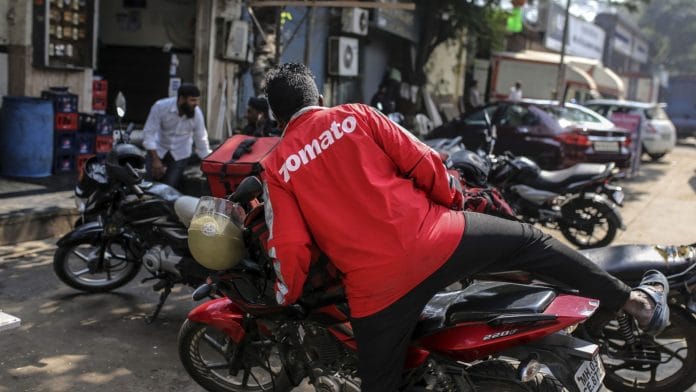
Thank you dear subscribers, we are overwhelmed with your response.
Your Turn is a unique section from ThePrint featuring points of view from its subscribers. If you are a subscriber, have a point of view, please send it to us. If not, do subscribe here: https://theprint.in/subscribe/
#RejectZomoto episode is a genuine cry for help from Tamil Nadu’s educated, white-collar and non-partisan youth. However, it is only a fraction of what is wrong with muscular, monolithic, linguistic imposition on South India at large and Tamilnadu in particular. Before we delve into the issue at hands (i.e.) Zomoto issue, let’s have a background of broader issues. Tamilnadu is the most urbanized state in the India. As a result, Chennai is the poster child of the melting pot of multi-culturalism and multi-linguistic city. It has been cemented by the advent of the Golden Quadrilateral highways by late Vajpayee government. With that came North Indian migrants seeking jobs in Chennai and rural Tamilnadu in early 2000s. Tamilnadu was in dire need of labourers and hired them without any qualms. Tamil employers and Tamil customers are largely kind to North Indian migrant workers despite lacking Spoken Tamil knowledge. On the contrary, Zomoto episode reeks of Hindi imposition and Hindi imperialistic attitude of the North.
Let me paint the picture after fleecing through several Tamil TV interviews given by the Vishesh, the original complainant of the saga. Everything starts with an online order via the Zomoto app for a chicken rice combo. When Vishesh received the order, pepper chicken from the combo order was missing. So he complained to the Zomoto customer care and the executive assigned to him called the restaurant. Vishesh consistently said in his interviews that the restaurant owner accepted the mistake in the conference call and was ready to repay the pepper chicken amount. However the Zomoto executive was suspicious that Vishesh received the entire order and was playing foul, using the Zomoto executive’s lack of Tamil knowledge. To add insult to injury, not only the executive refused to facilitate the pay back, she also escalated the issue by advising Vishesh.
And then came the crème of the crop comment: “The advice to learn basic Hindi at least;after all it is the National Language of our India”. Now truly triggered, Vishesh started his online crusade with screenshots. He tagged DMK MP Kanimozhi and DMK IT cell and Kanimozhi came out in support for Vishesh and asked the pan-Indian companies to have customer care cells in the respective regional languages. Finally, Zomoto apologized and gave back the amount the very next day. What instigated me to write the article is the cavalier attitude of Deepinder Goyal, the Zomoto CEO, reflected in his statement that India has become an intolerant country. Because, it has been misunderstood by many as ‘Tamil Nadu is intolerant’. Goyal should have tagged Vishesh, who also requested for the reinstatement of the said employee, while reinstating her. I wish Goyal used the same language when right wing influencers started a hashtag to boycott Zomoto for sending a non-Hindu delivery guy to a Hindu customer. In that particular issue, the company’s was a very diplomatic reply: “Food doesn’t have a religion. It is a religion”. They know who to snub, I guess.
If asking a Tamil customer living in Chennai to speak in Hindi is NOT the textbook example of Hindi Imposition, then I don’t know what is. If I were to start a restaurant in Uttar Pradesh and compelling my would-be customers to speak in Tamil language while ordering or raising an issue about the services, would any of you accept it? Gone are those days when the government asked you to speak in Hindi. Simpler times, indeed! Today giant North Indian corporations are demanding the customers and their own employees at different states to speak in their masters’ language. Scolding auto drivers, passersby on a busy road for not knowing Hindi in Tamilnadu has become a common sight these days. While the Zomoto episode indeed truly kindled 2K kids, who never knew the history of anti-Hindi riots of 1937 and 1965, they now learnt and understood them.
The Madras high court recently told the Union government that it is duty-bound to communicate in English with those states that have not adopted Hindi as their official language. Tamilnadu is the only state which did not accept Hindi as its official language. Besides, official language does not mean National Language. For the millionth time, India does not have a national language; only an official language to communicate amongst government offices. Even that cannot be enforced by a private entity. States across the country should mandate legally that giant corporations must employ regional workers or must offer services in the regional language of the state in order to do business in the state. That is the only way we can save the plurality of our culture and individuality of the linguistic states of India.
Also read: SubscriberWrites: India can take lessons from China on how to build national character
These pieces are being published as they have been received – they have not been edited/fact-checked by ThePrint.


COMMENTS